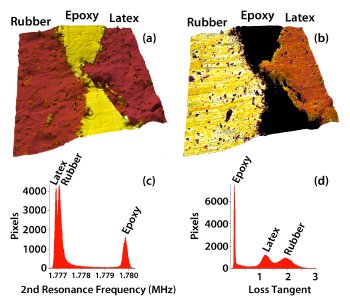Asylum Research, the technology leader in scanning probe and atomic force microscopy (SPM/AFM), will present Part 1 of three nanomechanics webinars on May 23. This first webinar, entitled "Introduction and Innovations in High Speed Quantitative Nanomechanical Imaging," will begin with a survey of the mechanical properties that can be investigated with the wide array of available nanoscale property mapping techniques.
 (a) AM-FM image (b) Loss Tangent image and (c) AM-FM histogram and (d) Loss Tangent histogram of a cryotomed latex/epoxy/rubber gum polymer sandwich. The AM-FM stiffness map clearly resolves the small elastic difference between the latex and rubber gum. The Loss Tangent difference is even more distinct.
(a) AM-FM image (b) Loss Tangent image and (c) AM-FM histogram and (d) Loss Tangent histogram of a cryotomed latex/epoxy/rubber gum polymer sandwich. The AM-FM stiffness map clearly resolves the small elastic difference between the latex and rubber gum. The Loss Tangent difference is even more distinct.
We will then introduce two new techniques that allow unambiguous interpretation of material nanomechanical properties: AM-FM and Loss Tangent. Amplitude-modulated (AM) atomic force microscopy, also known as tapping mode, is a proven, reliable and gentle imaging method with wide spread applications. Previously, the contrast in tapping mode has been difficult to quantify. The new AM-FM imaging technique combines the features and benefits of normal tapping mode with the quantitative, high sensitivity of Frequency Modulation (FM) mode.
Loss Tangent imaging is another recently introduced quantitative technique that recasts the interpretation of phase imaging into one term that includes both the dissipated and stored energy of the tip sample interaction. These techniques allow high speed, low force imaging in tapping mode while providing quantitative Elasticity and Loss Tangent images. Registration details can be found at www.AsylumResearch.com/webinars.
Said presenter and Asylum Research President Dr. Roger Proksch, "Nanoscale mechanical properties cover a breathtaking range of values. For example, the elastic modulus of common materials can range well over five or six orders of magnitude. The same can be said of the loss modulus of materials, with metal, glasses, and ceramics with low dissipation often behaving like ideal elastic solids, while many elastomers behave almost like liquids. A single nanomechanical technique - such as a force curve - is simply insufficient for accurately revealing sample properties and can often yield misleading and even inaccurate conclusions. Put simply, if all you have is a hammer, then all of your problems start to look like nails. During the course of this webinar series we will be looking at the wide range of techniques available to the researcher to cover the wide range of properties with which nature challenges us. A primary goal of this seminar series is to provide researchers with a solid overview of nanomechanical measurements, enabling them to critically interpret these measurements, and to provide a solid foundation for their future research."